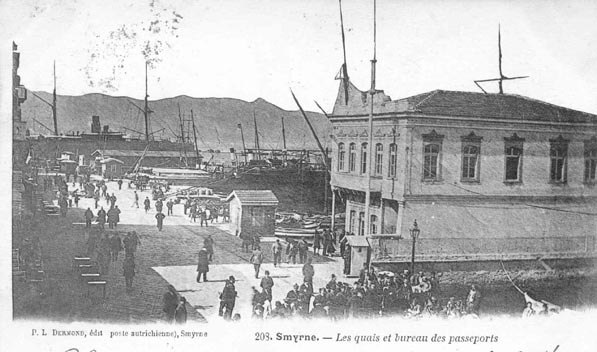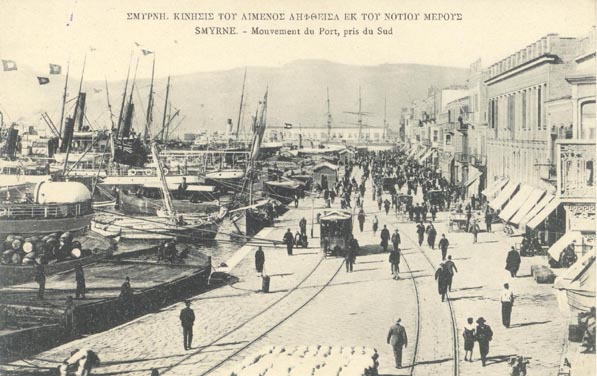 SMYRNA COMMEMORATIVE SERIES |
 Smyrna began to blaze from the advancing fire We barred our house and then didn't stick our noses out for days because we kept hearing gunshots outside. From the terrace we saw dead bodies in the street on the bare ground. Fortunately, we had a few provisions and so we didn't remain hungry. Nevertheless, on Wednesday, August 31 (13 September, new calendar) 1922, in the evening, we saw from the terrace that they were burning the Armenian section. We couldn't sleep and followed the course of the blaze, which was advancing toward our neighborhood. Our father then took us and we fled from the house. Our whole neighborhood began to empty out. The people pushed to Mortakia. We followed them, and when we crossed the railroad lines, we came out at the "Atsinganaria," which didn't have many houses because it was an open place. There was the church of St. John and we huddled there together with other people to pass the night. We were driven out of our homes so they could rob and murder Thursday, September 1 (14), 1922 dawned. In the morning a group of ten thugs arrived with knives in their hands. They began to threaten each person, one by one, that, if they didn't give money or a watch, they would kill him. They yelled, "Tsikar parayini, tsikar saatini!" ("Give up your money! Give up your watch!") My father gave them money. The man next to us didn't have anything to give them. So they stabbed him in the chest. The poor fellow rolled over on the ground and died wriggling in front of our eyes. And more, they killed two others. When they had robbed everyone, they ran to do the same thing to other people who were gathered a little further up in the open areas. Then our own people dispersed. Father took us and we pushed toward the neighborhood of Hatzi-Frangou. We crossed through, came out into the district of Psoma t'alani. And just when we reached the neighborhood of Keratohori, we saw that the church of St. John would burn, because the fire of Smyrna had reached this section. So we turned and headed for a street that brought us straight to the pier, to Bella Vista. But, here there was a tragedy. Dead people on the stone pavement of the pier and drowned people in the waters of the shore. There were heaps here and trunks there, mattresses, bundles of clothes, everything strewn about. Without hope, people sat there on the ground, while the city center burned. The heat and the smoke of the fire reached to the shore. We sat on the ground and cried over our misfortune and that of the Romioi of Smyrna. Suddenly, my father saw a small Turko-Cretan boy who was advancing with a donkey carrying two baskets and shouting in Greek "Selling grapes!" My father knew him and spoke to him. The youngster had a conscience and said straightaway to my father, "Barba Manoli, hide, because my father is searching for you so he can cut you up into pieces." Then we got up and went to the cemetery, because people were saying that the Tsetes would not go inside there to seize people.  They seized the girls and gathered up the men But when we came into the cemetery, we saw, laughingly, that even here the life of a Romios wasn't safe. It was full of people. Parents had opened almost all of the tombs to hide their girls, because during the night the Turks came and took them. We had our sister who was 18 years old and beautiful. For that reason my father searched and found an unopened tomb. It was marble with an ancient Greek order of vault atop a tomb and built by a wealthy Smyriot family. He opened the little door, went in and cleaned it. And there we stayed shut inside, Saturday and Sunday. On Monday, 5 (18) September 1922, in the morning, a military detachment came into the cemetery and brought all the people out to take us to Jardin de Fleurs [French -- "Garden of Flowers"]. The other day, when they [Turks] had come and taken all of the young men, they chased us away from there. Quickly, we fled from the cemetery and went to "Darayatsi" [Daragatz section of the Smyrna waterfront], to some military barracks. But Turks came there, too, and took girls. Then my father dressed my sister as an old lady, with a head kerchief, dirtied her face, built up a small hump on her back with rags, and dressed her in a long dress. And that way, we saved her from the hands of the animals who came one night. Next Page Page 1 2 3 |
|
|
